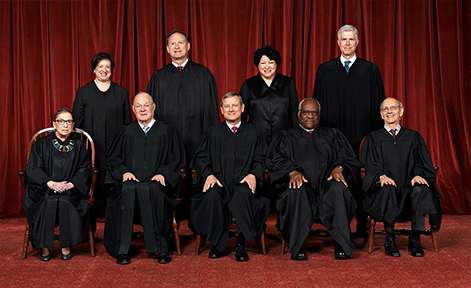The United State Supreme Court ruled Thursday that States will be able to force shoppers to pay sales tax when they make online purchases.
According to the case:
South Dakota v. Wayfair, Inc. (17-494)
He also explained how online retailers who have physical presence say the current law was unfair (APPLE, Macy’s, Target, and Walmart) because they were already collecting sales tax whereas online retailers were not–some were able to avoid charging sales tax.
Here is a Press Release from the National Retail Federation:
NRF says Supreme Court sales tax ruling creates ‘fair and level playing field’ between online and local retailers
WASHINGTON, June 21, 2018 – The National Retail Federation issued the following statement from President and CEO Matthew Shay in response to a U.S. Supreme Court ruling in South Dakota v. Wayfair allowing states to require online sellers to collect sales tax the same as local stores.
“Retailers have been waiting for this day for more than two decades. The retail industry is changing, and the Supreme Court has acted correctly in recognizing that it’s time for outdated sales tax policies to change as well. This ruling clears the way for a fair and level playing field where all retailers compete under the same sales tax rules whether they sell merchandise online, in-store or both.”
The court this morning upheld a 2016 South Dakota law that requires online merchants with more than $100,000 in annual sales to state residents or 200 transactions with state residents to collect sales tax.
NRF argued in a friend-of-the-court brief last year that the court’s 1992 Quill Corp. v. North Dakota decision was outdated and that sales tax collection is no longer the burden it might once have been due to changes in technology. In the brief, NRF cited a wide variety of software available to automatically collect the sales tax owed, much of its available free or at low cost.
NRF and other retail groups said in a second brief filed this year that lack of uniform collection is “inflicting extreme harm and unfairness” on local retailers by “distorting the retail market in favor of absentee ecommerce.”
The court agreed, noting “It is unfair and unjust to those competitors, both local and out of State, who must remit the tax; to the consumers who pay the tax; and to the States that seek fair enforcement of the sales tax, a tax many States for many years have considered an indispensable source for raising revenue.”
NRF has been a leading voice for equal sales tax rules for years, saying that Quill gave online sellers an unfair price advantage over local merchants.
Learn more here.
About NRF
The National Retail Federation is the world’s largest retail trade association. Based in Washington, D.C., NRF represents discount and department stores, home goods and specialty stores, Main Street merchants, grocers, wholesalers, chain restaurants and internet retailers from the United States and more than 45 countries. Retail is the nation’s largest private-sector employer, supporting one in four U.S. jobs — 42 million working Americans. Contributing $2.6 trillion to annual GDP, retail is a daily barometer for the nation’s economy.


1 comment
Everybody wants a piece of the pie and hardworking people take it up the pooper.
Comments are closed.